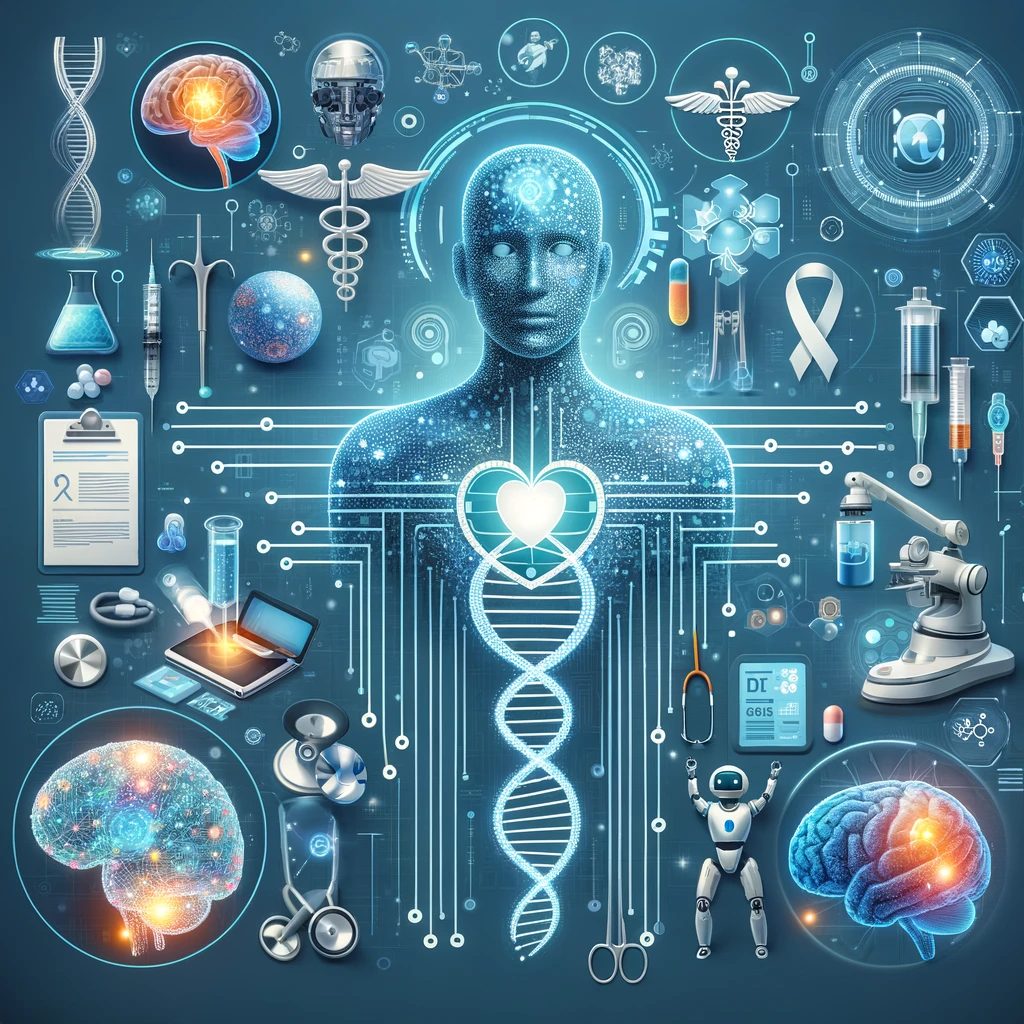In the contemporary world, medicine has witnessed an unprecedented transformation thanks to the incorporation of artificial intelligence (IA).
This article explores the impact of artificial intelligence on medicine, a topic that has sparked both hope and scrutiny.
AI promises to revolutionize diagnosis, treatment, research and health management, making medical care more accurate, efficient and personalized.
Browse the content

The Impact of Artificial Intelligence on Medicine: An Overview
Artificial intelligence is reshaping medicine in many ways. From clinical decision support systems to surgical robots, AI is at the forefront of medical innovation. It offers powerful tools for analyzing large volumes of data, enabling discoveries that were previously impossible. The impact of artificial intelligence in medicine can be seen in improving diagnostic accuracy, personalizing treatment and optimizing hospital workflows, promising more accessible and quality healthcare.
Advanced and Personalized Diagnostics
One of the biggest impacts of artificial intelligence in medicine is in the area of diagnostics. AI has the ability to analyze medical images with greater than human precision in some cases, identifying patterns that may escape the eyes of doctors. Additionally, AI-based systems are being developed to predict risks of chronic diseases, such as diabetes and cancer, long before the first symptoms appear, enabling earlier and more effective interventions.
Personalized Treatment and Precision Medicine
Artificial intelligence is also driving personalized medicine, where treatments and interventions are optimized for the individual. Through the analysis of genetic data and biomarkers, AI can help create treatment regimens that maximize effectiveness and minimize side effects. This not only improves patient outcomes, but also contributes to the efficiency of the healthcare system by reducing wasted resources on ineffective treatments.
Drug Research and Development
The impact of artificial intelligence on medicine extends to the research and development of new drugs. AI can significantly speed up the drug discovery process by quickly analyzing libraries of chemical compounds and predicting their effectiveness against certain conditions. This reduces the time and cost to bring new treatments to market, potentially saving lives by making new therapies available more quickly.
Improving Healthcare Accessibility and Efficiency
In addition to improving the quality of care, artificial intelligence promises to make healthcare more accessible. AI-powered healthcare chatbots can provide preliminary consultations and medical advice, reducing the need for in-person visits. This is particularly valuable in remote or underdeveloped areas where access to doctors is limited. AI is also optimizing hospital management, from resource allocation to appointment scheduling, increasing efficiency and reducing costs.
Impact of Artificial Intelligence on Medicine: Innovative treatments
As we explore the impact of artificial intelligence on medicine, it becomes crucial to highlight the specific treatments that are already being revolutionized by AI. These concrete examples illustrate not only the theoretical potential but also the tangible practical benefits that AI is bringing to the healthcare field.
Oncology: Personalizing Cancer Treatment
In oncology, artificial intelligence is transforming cancer treatment. AI systems, by analyzing genetic sequencing data from tumors, are helping to identify the specific mutations that drive cancer growth in each patient. This analysis allows doctors to personalize therapy by choosing drugs that target specific mutations. A notable example is the use of AI platforms to identify patients who will benefit from targeted therapies and immunotherapies, significantly improving treatment success rates.
Cardiology: Prevention and Treatment of Heart Diseases
In cardiology, AI is being used to predict the risk of future cardiac events, such as heart attacks, by analyzing patterns in electronic health data and test results. This allows for more effective preventative interventions. Additionally, AI-equipped wearables continuously monitor vital signs, alerting patients and doctors to potential problems before they become serious, facilitating a proactive approach to managing heart health.
Neurology: Advances in the Treatment of Neurodegenerative Diseases
In the field of neurology, artificial intelligence is opening new paths in the treatment of neurodegenerative diseases, such as Alzheimer's. AI systems are capable of detecting early signs of cognitive decline by analyzing subtle patterns in brain scans and other health data. This can lead to earlier diagnoses and interventions at earlier stages of the disease. Additionally, AI is helping to personalize treatment regimens for patients with neurodegenerative diseases, improving quality of life and slowing disease progression.
Diabetes: Personalized Management and Continuous Monitoring
In diabetes treatment, artificial intelligence is facilitating more personalized management of the disease. AI applications, integrated with continuous glucose monitoring devices, can predict fluctuations in blood glucose levels and provide real-time recommendations on diet, exercise and insulin dosage. This personalized approach helps keep glucose levels within healthy limits, reducing the risk of long-term complications.
Surgical Robotics and Operational Assistance
Surgical robotics, driven by AI, is revolutionizing the field of surgery, enabling more precise, less invasive procedures with faster recovery times. AI-assisted robots can perform movements with precision that surpasses human capabilities, reducing the risk of complications and improving surgical outcomes. Additionally, AI systems are being used to plan surgeries, simulating different scenarios and choosing the most effective approach.
Challenges and Ethical Considerations
Despite the benefits, the impact of artificial intelligence on medicine brings significant challenges. Issues of privacy and data security are pre-eminent, given the sensitivity of health information. Additionally, there are concerns about liability for errors made by AI systems and the need for appropriate regulation. It is essential that the development and implementation of AI in medicine is accompanied by rigorous ethical and legal debates.
Conclusion About the Impact of Artificial Intelligence on Medicine
The impact of artificial intelligence on medicine is reshaping not only how diagnoses are made and diseases are understood, but also how treatments are administered. As these technologies continue to evolve, we can expect to see even more significant advances in healthcare. The integration of AI into medical practice is not just a future promise; It is a reality that is improving the effectiveness of treatments, the efficiency of healthcare and the quality of life of patients today. The path forward is promising, and medicine is just beginning to unlock the full potential of artificial intelligence.







